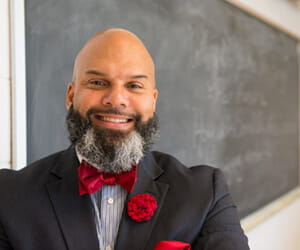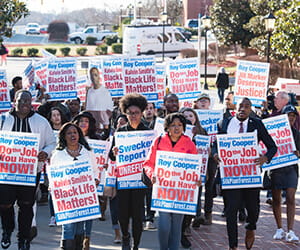
Growing up in the housing projects of New York City, Dr. Jack Monell ’05 could not get one question out of his mind: “Why does it seem like this community is stuck in a rut?”
Monell, a PhD in Human Services graduate, looked at the poverty, drug abuse, and social injustice around him and was drawn to explore it through his education and career. He has worked on juvenile justice and community justice programs for the government and currently serves as associate professor and program coordinator of justice studies at Winston-Salem State University (WSSU) in North Carolina. Monell takes special interest in the issues surrounding masculinity and young black men, the inaccurate profile that the media perpetuates of these young men, and how that warped perception leads to violence and harm in black communities.
“I was always aware of these issues and working to help individuals affected by them, but once social media became part of the conversation, I was struck by the enormity of the problem,” Monell says. Movements such as Black Lives Matter—which began with a hashtag and led to chapters of activists across the nation—have shone a light on these injustices in a new way.
“Every day, you see the abuse and social disparities taking place across the country that didn’t get press coverage before,” he says. “There is a nationwide movement to increase awareness and redress these wrongs, and social media has become a tool to encourage people to take action.”

Monell has seen the power of social media activism firsthand. “In 2016, students at WSSU and Wake Forest University started a social media campaign to advocate for the release of Kalvin Michael Smith, a black man who had been wrongfully incarcerated for 20 years,” he says.
“That campaign spurred marches and protests, significantly increasing the visibility of the cause,” Monell says. “I believe that played some part in his release from prison. It’s a great example of how students can gather information and move with it. They started a movement that worked with the constructive use of social media.”
Passion is important, but Monell reinforces the importance of thinking critically about where the movement comes from and where it’s going rather than getting caught up in emotions alone. In one of his classes, students work together to identify a social injustice, go into the community to research its effects, and present how they would solve the problem if they had unlimited resources.
This project recently led to a partnership with a local retiree group, which will help students learn about ageism. They will then work to educate their peers and the community about the stereotypes older people face.
“A lot of people feel intimidated by marching or protesting, but there are other ways to express yourself,” Monell says. “Find the best modality to protest, one that works for you. Use your gifts and strengths to speak up. Make small sacrifices, and you’ll be surprised how everyone’s small actions add up to bigger change.”



